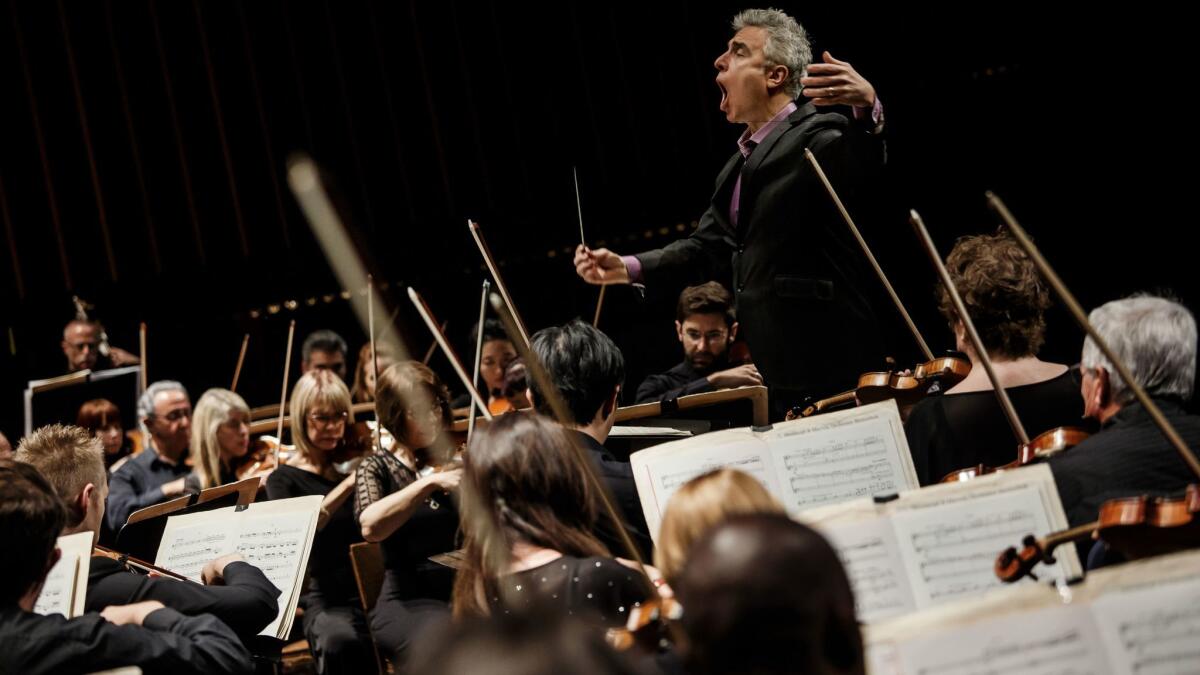Review: A spiritually yearning Beethoven Ninth in Pasadena

- Share via
A symphony of symphonies, the Beethoven Ninth is where the composer “finds a solution of his intolerable yearning by making himself one with the human family,” British author J.W.N. Sullivan once wrote in study of Beethoven’s spiritual development.
On Saturday, in this season of Beethoven Ninths (to say nothing of intolerable international yearnings), it became the Pasadena Symphony’s turn toward oneness.
But where to turn?
The Ninth, which typically lasts between 65 and 70 minutes, begs for context. Jeffrey Kahane’s Los Angeles Chamber Orchestra offered a Ninth a week earlier that became an opportunity for the outgoing music director to make a political statement with a profoundly humanistic spoken introduction to the score. Next week in New York, another outgoing music director, Alan Gilbert, has chosen to preface a New York Philharmonic Ninth at Lincoln Center with Schoenberg’s short Holocaust cantata, “A Survivor From Warsaw.” Gustavo Dudamel’s selection for the Los Angeles Philharmonic is Aaron Copland’s “Fanfare for the Common Man,” which will precede the Ninth in a performances at the Hollywood Bowl in July.
In closing the Pasadena Symphony’s season at Ambassador Auditorium, David Lockington reminded us that Beethoven’s “intolerable yearning” led the composer into exploring Eastern mysticism. British and a cellist, Lockington enticingly opened the program Saturday (played twice; I attended the matinee) with two British odes to music’s transcendent powers — Ralph Vaughan Williams’ “Serenade to Music” and Gustav Holst’s “Choral Hymns from the ‘Rig Veda.’”
The Vaughan Williams, heard in its version for chorus and orchestra (there is one for 14 vocal soloists), is a sentimental serenade meant to melt the hearts of music lovers. Even a bad performance can bring a tear to the eye, if the only thing it holds in common with Beethoven’s Ninth, besides a good tune, is its unblinking belief in the power of music to stir emotion.
Like Beethoven, though, Holst was a searcher into mystical auras, so much so that he learned enough Sanskrit to make his own translations of four groups of choral settings of ancient Vedic hymns in the early 20th century, an Indian exoticism that later led Holst to his astrologically tinged “The Planets.”
The third of the four “Rig Veda” groups is for chorus and harp (or piano), and here Lockington did something peculiar, making a new arrangement for chorus, cello, harp and percussion, and writing interludes to the hymns to the dawn, the waters, Vena and travelers. The choral parts were sung by the Los Angeles Children’s Chorus, along with a few women from the Donald Brinegar Singers, the main chorus for Vaughan Williams and Beethoven. In Vedic hymns Lockington was the effusive cellist and the children’s chorus director, Anne Tomlinson, conducted, though without effusion.
But the real peculiarity was just how ineffective this all was in Ninthland. As became clear only after intermission in an impressively high-octane performance of Beethoven’s symphony played at Formula One speeds, the first half of the concert felt under-rehearsed, robbing Vaughan Williams of his transcendence and Holst of his mysticism.
The Ninth was another matter. The first three movements were as fast as I have ever heard them, outpacing even Kahane’s urgent performance with a flexible orchestra half the size of the Pasadena Symphony. There was little opportunity for spiritual, or any other kind of, contemplation. There was no time for pregnant pauses, which Beethoven theatrically throws in. Beethoven’s startling metrical switches in the Scherzo flew by without startling.
The sensation was like gliding on a hovercraft above the Beethovenian waves. If I read Lockington’s intention correctly, he looked at the symphony from above rather than attempt a priestly spiritual depiction of a composer’s inner workings of Beethoven. You know that this particular ocean is deep and full of mysterious life (and maybe even the mysteries of life), but the conductor is not conducting you there. Instead, he is showing the way to the water. Only you can dive in.
In the meantime, Lockington provides a joy ride. Without risers to help bring out the individuality of the winds and brass, the orchestral sound was unusually homogenous. The players were determined to keep up and they did.
For the choral finale, Lockington got slightly more grand (if he hadn’t he might have clocked in around an hour), the “Ode to Joy” theme becoming a major arrival point. The four vocal soloists — soprano Summer Hassan, mezzo-soprano Tracy Van Fleet, tenor Arnold Livingston Geis and bass Steve Pence — probably had to save a little something for a repeat performance that evening.
The moment to remember was when the children’s chorus marched out and stood in front of the stage to join the Brinegar Singers in the recap of the “Ode to Joy.” For an instant, this became an inspiring Beethoven Ninth for a new generation of yearners, and then the hair-raising rush to finish, which picked up big time in the coda, told us that can’t happen too soon.
More to Read
The biggest entertainment stories
Get our big stories about Hollywood, film, television, music, arts, culture and more right in your inbox as soon as they publish.
You may occasionally receive promotional content from the Los Angeles Times.











